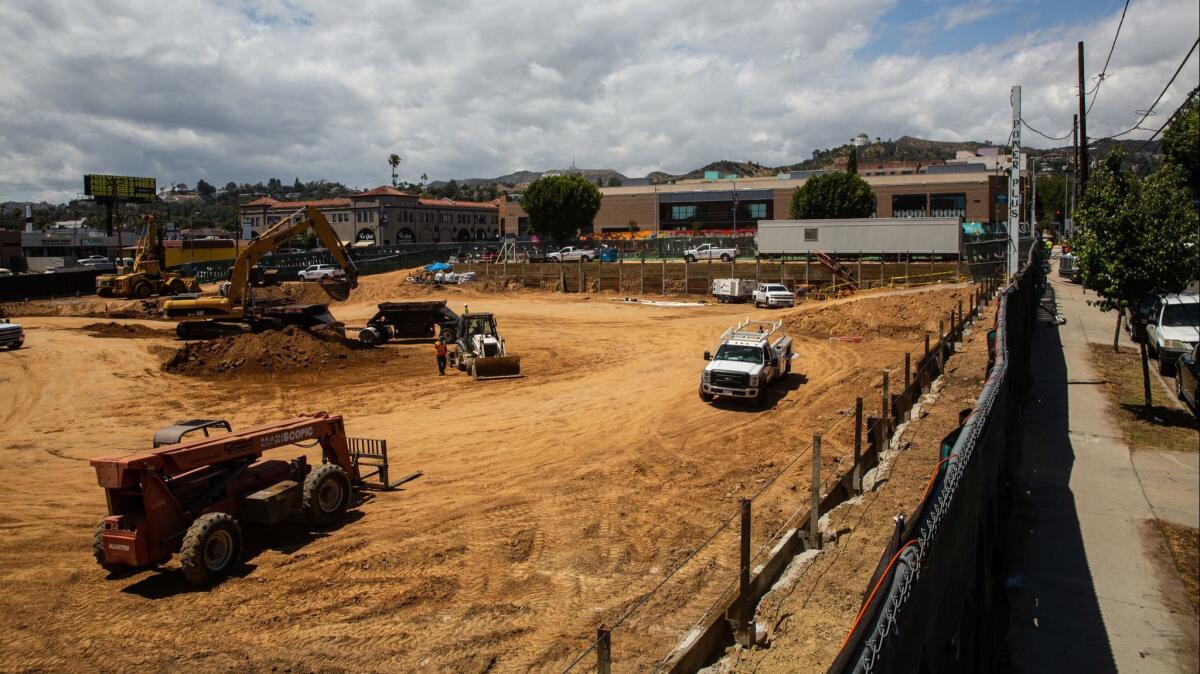L.A. tightened rules about tearing down housing. Now this project could be exempt

Worried that Los Angeles was losing crucial housing, the City Council decided to stiffen rules that can require developers to build affordable units when they tear down rent-stabilized apartments.
Less than two years later, the council is weighing whether to carve out a new exemption to those stricter requirements.
Councilman Mitch O’Farrell proposed the move, saying the city should grandfather in projects that had already gotten city approval when the rules were changed and had a “high percentage” of affordable units.
Housing department officials say only one project is expected to qualify: a new development that will rise on Hollywood Boulevard west of Barnsdall Park.
The firm pursuing the project, LaTerra Development LLC, has lobbied the council over the rules and made political contributions to O’Farrell and Councilman Gil Cedillo, who heads a council committee that backed the proposal Wednesday. O’Farrell planning director Craig Bullock said that spending did not affect their decision.
“This is about the city changing the rules during the process,” Bullock said, pointing out that the Hollywood Boulevard project had been approved before the new requirements went into effect.
If it could not get the exemption, he said, the project would not pencil out and “we wouldn’t get 150 units of housing,” including 24 affordable units.
The plan, which now goes to the full council for approval, has troubled critics who argue that L.A. should not be providing such exemptions, even for just one project.
As L.A. faces a housing crisis, “letting private developers off the hook from their obligations to set aside affordable housing units will only further exacerbate the problem,” North Hollywood resident Yuisa Gimeno wrote in a letter.
“If they allow this one, this opens up the door for other developers to claim the same thing,” Gimeno later added.
Los Angeles has a long list of rules surrounding its Rent Stabilization Ordinance, which limits annual rent hikes for tenants in older buildings.
If landlords tear down such apartments and replace them with new rentals within five years, all of the new apartments are supposed to fall under rent stabilization.
However, if builders want to avoid doing that, they have an alternative: They can enshrine some of the new units as affordable housing, which must be affordable to renters with incomes at or below 80% of the area median income.
The question is exactly how many.
In the past, builders could either make sure at least 20% of their new units were affordable or create at least as many affordable units as the number of rent-stabilized apartments they had torn down — whichever number was lower.
Under the stiffer rules passed two years ago, the minimum requirement is whichever of those two numbers is higher.
When those tighter rules were passed, business groups complained that they could be onerous for big projects, especially if a real estate developer is tearing down a small, rent-stabilized building and replacing it with a complex that is far bigger.
Tenant activists countered that the city needed to push for more affordable units amid a housing crisis.
O’Farrell proposed the new exemption for applicants who meet two specific criteria: They had to have gotten discretionary approval from the city for their projects before the new rules went into effect on June 4, 2017, and they had to set aside at least 15% of the units in their buildings for “very low income” households.
Planning officials found that only one project — located at 4900 Hollywood Blvd. — would meet those criteria, according to housing department spokeswoman Sandra Mendoza.
Two years ago, L.A. officials approved that project, which was expected to give rise to 150 new residences, including 24 “very low income” units — more than enough to replace the rent-stabilized units that were torn down.
Under the stricter requirements, however, housing officials say it would have to provide at least 30 units of affordable housing.
Tina Choi, a consultant representing LaTerra, told council members Wednesday that if the proposed amendment were not approved, “we would not be able to build the residential project.” Bullock added that even if the exemption is created, the company would still have to apply and demonstrate that it has a financial hardship.
LaTerra “remains committed to providing affordable housing in Los Angeles,” the company said in a statement.
LaTerra, which is planning another housing complex next to the Hollywood Boulevard project, purchased the site after the city granted approval for the development. The firm spent at least $13,000 on lobbying the city over the proposed exemption in the last year, city records indicate.
The Times also identified more than $100,000 in additional lobbying payments to Choi’s firm involving the Hollywood Boulevard project in the last year, but it was not immediately clear how much of those costs were related to the exemption.
A LaTerra spokeswoman said the proposed change was a “small component” of Choi’s work for the firm.
Council members got a flurry of letters criticizing the plan in February, when the committee was first scheduled to consider it. After L.A. officials said the proposed exemption would apply only to one project, some of those critics said their concerns had shifted.
“We just want to make sure that this proposed change … doesn’t become a precedent,” said Rene Moya, director of Housing Is A Human Right, a division of the nonprofit AIDS Healthcare Foundation.
Twitter: @AlpertReyes
More to Read
Sign up for Essential California
The most important California stories and recommendations in your inbox every morning.
You may occasionally receive promotional content from the Los Angeles Times.











